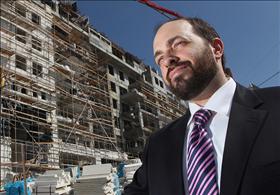House and Home
What will become of the North?
If new ultra-Orthodox neighborhoods forming in the North of Israel are not accompanied by job creation, these areas will become a poverty trap.
03/04/2012 10:40
Tags: Economic impact · Ministry of Housing and Construction · Ariel Atias · Ha'aretz · Uri Regev

Housing Minister, Ariel Atias from Shas at a construction site in Jerusalem. 22.07.2010. Photo: Yossi Zamir, Flash 90
Last week, the cornerstone of a new ultra-Orthodox neighborhood in Tiberias was laid. There was much fanfare and celebration of the beginning of construction, which follows a growing trend of ultra-Orthodox migration to the north of the country in search of affordable housing. A four-room apartment in this new town, Kiryat Sanz, will be just 500,000 NIS, or around $130,000.
But many voice concern over this trend, and the impact of this migration. Rabbi Uri Regev, President of Hiddush, spoke to Ha’aretz, warning about "the possibility of massive Haredi movement to the north not being accompanied by a jobs-creation policy. This would mean that Haredi cities, or cities with growing Haredi populations, would become poverty traps.
The government and Atias should be forced to create large employment centers alongside ultra-Orthodox neighborhoods, to ensure that the influx of Haredim creates prosperity in the north, rather than turning it into a low income, needy region.
"It appears the only thing that concerns Ariel Atias is finding low-cost housing solutions for his constituents, and subsidizing a large portion of the housing units' prices," Regev added. "That's not enough. The government and Atias should be forced to create large employment centers alongside ultra-Orthodox neighborhoods, to ensure that the influx of Haredim creates prosperity in the north, rather than turning it into a low income, needy region. Shas, perhaps, prefers its constituents to be needy and dependent; but the state cannot afford to bury the Galilee in poverty."
Minister Ariel Atias has been heavily criticized for his prioritization of the ultra-Orthodox population with regard to housing subsidies, refusing to implement the recommendations of the Trajtenberg Committee which asked that priority for subsidies be given to those who work or are seeking to work. Atias’ newest provision gave no stipulations for engagement in the workforce. 60% of ultra-Orthodox men do not work and are not seeking to, rather studying indefinitely in yeshivas and receiving government subsidies.
See the article in Ha’aretz